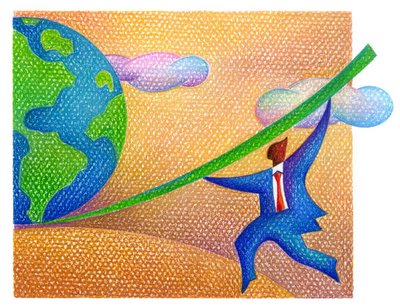Thursday, January 25, 2007
Burnout Assessment: How to tell if you have LBO (lawyer burnout)

Here are some telltale signs of lawyer burnout:
- You seem to be less productive although you're spending the same amount of time at work.
- You dread going into the office.
- You suffer from intense fatigue and low energy.
- You have little or no interest in the law, your work environment, colleagues or clients.
- It's tough to stay focused.
- You've lost the ability to experience joy.
- You drag yourself into work and have trouble getting started once you arrive.
- Youve become noticeably more irritable and less patient with co-workers, and/or clients.
- You believe that you face insurmountable barriers at work.
- Nothing in life seems to interest or excite you.
- You feel disillusioned about the practice of law on a consistent basis.
- You are self-medicating — using food, drugs or alcohol — to feel better or to not feel anything.
- Your sleep habits or appetite have changed (insomnia, loss of appetite.)
- You are experiencing chronic headaches, neck pain or lower back pain.
If you answered yes to 3 or more of these questions, you may be experiencing burnout. It may be time to take a hard look at what's working in your career and in our life.
Consider these questions
- Can you keep up this pace for the next 3-5 years?
- Are you satisfied with your quality of life?
- What might you risk if you continue on your current path?
For some life balance strategies: click here http://esqdevelopmentinstitute.blogspot.com/2005/11/cases-and-chaos-life-balance.html
Check back for our next in the LBO series: Common causes of Lawyer Burnout(LBO)
Tuesday, January 02, 2007
Who Is Most At Risk of LBO (lawyer burnout) and What To Do About It.
 Usually, it is the best and the brightest lawyers who are most vulnerable to lawyer burnout. Ambitious, capable people, who have high expectations of themselves are particularly susceptible. So, if the following tends to describe you...you may be at risk:
Usually, it is the best and the brightest lawyers who are most vulnerable to lawyer burnout. Ambitious, capable people, who have high expectations of themselves are particularly susceptible. So, if the following tends to describe you...you may be at risk:Feel a pressure to succeed: What lawyer doesn't?
Tend to over-commit: Multi-tasking and taking on an unreasonably heavy work load is a way of life for most attorneys.
Need to be in control all the time: A prerequisite for being a great lawyer
Lack work-life balance: With all the billables, cases and clients...who has time for a life?
Tend to be inflexible: Lawyers are trained to pick a side and stick to it.
Unable to relax: Tough to relax when you have looming deadlines, mounting voice and e-mails and demanding clients.
What you can do
Get help.
Too often lawyers like to do things on their own. Check out your firm's EAP program or seek out the help of therapist or a Professional Coach who specializes in working with lawyers.
Here are some things you can do you your own to help alleviate some of the symptoms associated with burnout:
- Re-evaluate your goals and prioritise them
- Evaluate the demands placed on you and see how they fit in with your goals
- Identify your ability to comfortably meet these demands.
- If you are over-involved, reduce the commitments that are excessive
- If people demand too much emotional energy, become more unapproachable and less sympathetic.
- Involve other people in a supportive role. You owe it to yourself to avoid being bled dry emotionally.
- Learn stress management skills
- Examine other areas in your life that are generating stress, such as work or family, and try to solve problems and reduce the stress
- Get the support of your friends and family in reducing stress
- Ensure that you are following a healthy lifestyle:
- Get adequate sleep and rest to maintain your energy levels
- Ensure that you are eating a healthy, balanced diet - a poor diet can make you ill or feel bad.
- Get adequate regular aerobic exercise
- Limit your caffeine and alcohol intake
- Acknowledge your own humanity: remember that you have a right to enjoy a healthy quality of life.
If you think you may be suffering from burnout and you'd like to get some help...send an e-mail to Info@EsqDevelopmentInstitute.com to set up a complimentary coaching session.
Sunday, December 31, 2006
Tips for Lawyers: Creating Effective Habits in the New Year

Its that time of year where we all feel enormous pressure to make resolutions for personal and professional improvement.
Lawyers are no exception!
The problem is too often we set new goals without a real plan of how were going to avoid reverting to our old habits.
Habits can be a friend or foe. Think of a habit as a pattern of behavior. Successful habits...help us to achieve success...other less success building habits can serve to undermine our efforts to achieve.
Here is a great exercise for getting rid of old habits and replacing them with habits designed to help you to effectively achieve your objectives.
STEP ONE:
List 3 or more habits that are currently holding you back from achieving your goals and describe how these habits negatively impact your life.
EXAMPLE:
Habit: Overspending: No savings/investments for the future
Impact: Unable to achieve financial and retirement goals' stressed about money
STEP TWO
List successful habits you will choose to adopt in place of the "bad" habits and the benefits of adopting the new habit
EXAMPLE:
Successful New Habit: Begin investing with the help of a financial planner.
Benefits: Debt free, financial freedom, comfy retirement.
STEP THREE
Create a 3 step action plan to jumpstart each new habit. Be specific, pick a start date, a completion date and get started!
EXAMPLE:
Action Plan
1 Find an excellent financial planner
2 Set up a monthly savings and investment plan
3 Create a realistic spending plan and look for ways to trim unnecessary spending
Start Date: January 7
Completion date: January 17th
Implementing new habits, new patterns of behavior, will take time. Stay committed to the process and you’ll soon achieve your desired results.
Thursday, November 30, 2006
Cases and Chaos: Life Balance Strategies for Busy Lawyers

Today, an increasing number of lawyers are experiencing burnout, low productivity, insomnia, and stress-related illnesses . . . undoubtedly due to a lack of balance between their professional and personal lives.
The American Bar Association has reported that one of the main reasons lawyers consider leaving the profession is the desire to spend more time on personal and family needs. The most commonly reported obstacle to a balanced life is the sheer number of hours lawyers are required to work. Although many firms give lip service to promoting work-life balance, their expectations that attorneys work long days and meet increasing billable hours is clearly inconsistent. What is balanced for one person may differ for another because individuals have various goals, values, and definitions of success.
However, there are some common definitions of balance that include:
- Having a sense that there is enough time in the day to effectively accomplish work-related tasks.
- The ability to get through your daily work and family responsibilities without feeling drained.
- Having the ability to participate in activities you enjoy on a regular basis.
At the heart of successful work-life balance is:
Accomplishment: getting the stuff we need to get done accomplished, and
Enjoyment: having the time for loved ones, fun, rest, exercise and hobbies.
Although the concepts of achieving balance are simple, actually creating a balanced life isn’t easy—but it is definitely worthwhile.
Here are some steps to help you on your journey toward life balance. It’s a process, so be patient with yourself, and take it one step at a time.
1) Determine your values and priorities. Yeah, I know . . . feels like everything is a priority. Yet too often, our time and energy are spent on things that we don’t really care about. Once you’re clear about your values and priorities, you can begin saying “no” to those things that move you further away from life balance, and ”yes” to those things that are in alignment with your values. You can begin to structure your life in a way that supports the personal and professional goals you want to accomplish. Determining the goals you want to accomplish and the quality of life you want to live will help guide you toward finding balance.
2) Identify your balance “blockers”. Balance blockers are those thoughts or actions that stand in the way of achieving balance. It’s basically a perspective we maintain to justify our inability to pursue balance-related goals.
Some examples of blockers are:
Living for the expectations of others at work and at home.
Consistently putting the needs of others before your own.
Fear of change.
A hang-up on appearances.
Perfectionism.
Once you identify your blockers, pay attention to when you use them as excuses to justify a lack of balance in your life. Explore ways to accomplish your goals in spite of your particular balance blockers.
3) Balance your mind. The key to balance is all in your head. Begin to think differently! Many attorneys feel guilty about focusing on work-life balance or they believe taking time out for themselves, away from work, is unproductive. I’ll tell you what I tell my clients: GET OVER IT! Most of the time, we treat our cars better than we treat ourselves. What’s the first thing we do when we notice our car is low on gas? We fill our tanks! Well, living a more balanced life is about filling your tank. Those initially cynical lawyers who reluctantly committed to living a more balanced lifestyle now report that they are more relaxed, have more time for themselves and haven’t sacrificed their jobs or their level of professionalism in the process!
4) Create “non-negotiable” time blocks twice weekly. Non-negotiable time is personal time that you set aside for yourself that absolutely cannot be rescheduled or canceled . . . it’s simply non-negotiable. Devote at least 30 minutes to these time blocks. Write the non-negotiable appointment in your palm or day planner as you would for any other appointment. You can use the time for anything NON-work related. This time is allocated to focus on you. Go workout, get a massage, take yourself to the park . . . or do nothing! Just pick something that you’ll enjoy. It may feel strange at first, but commit to do this for at least 6 weeks . . . and guess what? You’ll get the hang of it!
5) Consider hiring a professional coach. When you’re trying to achieve a more balanced life and everyone around you is being rewarded for working round the clock, it’s tough to stay focused. The truth is, making change that will affect you personally and professionally can be challenging, even when the change will have a positive impact on your life. This is primarily because familiar patterns are hard to break. The bottom line is that lawyers need someone to talk to. Not a partner in the firm, significant other, colleague or friend, but someone whose only job is to help you plan your career, manage your life, and set goals to keep you on track. That is the job of a professional coach.
6) Create a vision. Having a vision of what you want to accomplish is a powerful tool for achieving any goal. Write down your vision of a more balanced and fulfilling lifestyle. In creating your vision, consider what you would have time to do if your life was more balanced than it is today. What would you no longer do? How would your career improve? What impact would a more balanced life have on your relationships, your quality of life, and your clients?
Why is work-life balance important?
Because working at the expense of your mental and physical health will ultimately lead to burn-out. Instead set aside some quality time and begin incorporating some work-life balance strategies. Be patient with yourself and seek support as you implement the changes. The result? You’ll be a healthier more effective lawyer.
Tuesday, November 21, 2006
Executive Coaching For Lawyers
 If you've been cynical about the benefits a lawyer can gain from working with a Coach... read on!
If you've been cynical about the benefits a lawyer can gain from working with a Coach... read on!Marie noticed that Diane seemed to be sailing through her career and receiving nods from the firm's partners. According to Marie, Diane was extremely successful in handling her cases, developing strong relationships with her clients and seemed to be building a successful career on all fronts. As a third year associate, Diane was viewed as a rising star in the firm and was getting several choice assignments many of which Marie had hoped to get. After inviting her to lunch, Marie learned that Diane had been working with an Executive Coach. During lunch, Diane credited her Coach with helping her develop and implement a strategic action plan to help her: 1) improve weak areas in her performance, 2) enhance and strengthen her professional image and 3) get on the fast track to partnership. According to Diane, "Hiring my Coach was the wisest career move I could have made She provided me with the direction I needed to take my career to the next level."
One week later, Marie hired her own Coach.
Professional Coaching is for lawyers who are ready to excel, enjoy a better quality of life and gain an edge on the competition. In fact, Professional Coaching is popular throughout the business world. Organizations like Kodak, IBM and Wachovia have Professional and Executive Coaches on staff as part of their professional development programming.
Why coaching for lawyers?
Because we need it.
The practice of law is demanding, and it takes a toll on our personal and professional lives. In April 2004, The California Bar Journal reported that the rate of depression among attorneys is four times higher that of the other professionals and the general population. Nationwide, Lawyers Assistance Programs are working with lawyers who are coping with stress-related emotional and substance abuse issues. Many of these programs have recently seen sharp increases in the numbers of lawyers seeking help.
Fact: Lawyers need someone to talk to. Not a partner in the firm, significant other, colleague or a friend, but someone whose only job is to help you plan your career, manage your life, and set goals to keep you on track. Someone who can help you balance the professional and personal demands, and keep you focused on what is really important. That is the job of a Professional Coach.
Coaches are trained to help clients achieve powerful results. Like lawyers Coaches are trained to achieve successful results for their clients. To that end, there are systems of accountability incorporated into the coaching process to move clients forward and deepen insights.
What types of things can a Coach help with?
Lawyers can use a coach to work on any issue impacting them personally or professionally.
Some attorneys choose to work on improving their professional performance, while others are looking for ways to better manage stress, burnout or to achieve work/life balance. Other lawyers want to improve their managerial skills. While others hire a Professional Coach because they need help leaving the practice of law or finding a more fulfilling position within the law. Although clients report that they find coaching to be therapeutic, coaching is not Therapy. Coaching is present and future focused, and unlike therapy, coaching does not address mental health issues or past traumas and experiences.
According to a 2001 article published in the Massachusetts Lawyers Weekly:
"Lawyers are good subjects for coaching because they are results-oriented professionals. But like most busy professionals,it is hard for lawyers to consistently focus on things that are important,but not urgent. In addition, while attorneys may get good training in "lawyering" in the early years of practice, they are less likely to get any consistent and focusedtraining on how to develop their professional and personal lives. A law degree can still open up a lot of doors for you, but real career satisfaction takes both hard work and planning. Having the degree, and working in a good law firm, are not enough."
Coaching is a collaborative process that is focused and results oriented. A Professional Coach can help lawyers overcome challenges, increase strategic thinking and improve communication skills. In addition, many lawyers hire Coaches to help them develop a savvy professional image, cultivate ongoing career and personal goals and to achieve greater work-life balance. Unlike a consultant, a Coach doesn't come in and solve the problem for you. Instead, a Coach partners with you to assess how best to resolve issues and achieve your goals.
How does Coaching work?
Most Coaches meet with their clients via telephone on a weekly basis. Sessions usually last 30-40 minutes. Coaches are governed by the International Coaches Federation which requires that all client/coach communications be held strictly confidential.
So in a nutshell...an Executive Coach can provide the insight, accountability, resources and strategic planning that a lawyer needs in order to build a successful career and fulfilling personal life.
Would you like to learn more?
The best way to learn about Coaching is to experience it. Set up a Complimentary Coaching session, and receive help with a personal or professional development issue. No strings. To schedule an appointment send an e-mail to Info@EsqDevelopmentInstitute.com. Write "Complimentary Coaching Session" in the subject line and our lawyer coach will contact you shortly.
Monday, November 20, 2006
Top 10 Ways a Lawyer Can Benefit from Working with a Professional Coach

1. Achieve better focus. When the majority of your time is spent juggling cases, keeping track of clients, meeting goals for billables and balancing your personal life, it's hard to focus on anything other than making it through the day. A Professional Coach will help you focus your energy so you can achieve your goals with greater ease despite your hectic schedule.
2. Manage and Develop a Successful Legal Career. Developing a successful career depends largely on your ability to structure your career in alignment with your personal and professional goals. Coaching can help you clarify your vision and goals. When was the last time you considered what YOUwant in your legal career and in your personal life? The practice of law is fast paced and it's tough to find time to slow down and ask yourself some meaningful questions. Through Coaching, you'll have the opportunity to examine what you want, what motivates you, where you get stuck or distracted and much more. The coaching process allows you to learn about what you value, what it will take to build a fulfilling career and how you can design a balanced personal and professional life. When was the last time you had a conversation with someone who was fully committed to you and your success? That's the job of a Professional Coach.
3. Develop a Values-Based Professional Development Plan. Success doesn't happen by accident. You must PLAN what you want to achieve and determine the best way to go about getting there. Consider your career plan as the roadmap for your career. Where do you see yourself 5 years from now? How will you get there? What resources will you need? A Coach can help you create a plan that is in alignment with your personal and professional values and overall vision for your life and career.
4. Increase Productivity. Productive people have the ability to complete their work on time and in an efficient manner. How many times have you committed to completing a task only to have the needs of someone else get in the way? At the core of Professional Coaching is accountability. Knowing that you've made a commitment to yourself AND told someone else about it, makes you more likely to stay on task. Your Coach holds you accountable for what you say you want to accomplish, and then continues to work with you as you achieve your goals and increase productivity.
5. Navigate a Job Change or Career Transition. Too often, lawyers get locked into a job because they lack the tools needed to determine their next steps. Changing jobs, switching to a new practice area or transitioning to a new career can be tough. So tough in fact that many lawyers end up STUCK in an unfulfilling career for years. A Coach can provide you with the insight, resources and feedback needed to make concrete decisions regarding your career. If it'ss time to move up or out a Coach can help you make that decision faster and with greater ease than you would on your own.
6. Improve Time Management and Practice Management Skills. Lawyers are slaves to time yet few if any law schools provide training on how to successfully manage time. Case files, motions, clients, conference calls, deadlines, e-mails and meetings are simply a fraction of what goes on in a typical lawyer's day. Too often everything feels like a priority and lawyers report feeling overwhelmed, stressed and ultimately burned out. A Professional Coach can help you to take an honest look at your schedule and how you currently spend your time and manage your practice. Based on this information your Coach can help you create a strategy where you can achieve more in less time, with more time for a healthy personal life. Goodbye burnout!
7. Develop a Unique Brand for Improved Marketing. The practice of law is competitive and it's important to create a brand that effectively communicates your value to your employer, colleagues and potential clients. Why should they hire you over another lawyer? A Coach can work with you to create, develop and communicate your unique value proposition to others in a way that will help you develop a successful reputation and career.
8. Discover your Passion in the Law. Have you met lawyers who report feeling disillusioned with the law or report feeling lost? These feelings tend to emerge in a career when there is a misalignment between the work the lawyer is involved in and his or her personal and professional values. Sustaining a successful career in the law requires the pursuit and attainment of work in alignment with your passion, interests and strengths. Through Coaching you'll have the opportunity to gain clarity about your ideal work and work environment and then take the necessary action steps toward designing a successful and gratifying legal career.
9. Create Boundaries. Working with a Professional Coach can help you evaluate what you say "yes" to because you want to and what you need to quit saying "yes" to. A Coach can help you find the cure for the "disease to please" and the inability to delegate effectively. Through coaching you'll have the opportunity to consider what you need to say "yes "to or "no" to in order to respect your boundaries and function more effectively in your legal career.
10. Achieve Work-Life Balance. Lawyers are required to maintain hectic schedules under incredibly stressful, high pressure situations. After maintaining such a pace many lawyers experience burnout, depression and other stress related illnesses. Like others in high pressure professions, lawyers need find an outlet to relieve the stress of work. A Coach will help you to take charge and create a more balanced life. A Professional Coach can help you find time for family, friends, hobbies AND a successful law career.
Tuesday, November 07, 2006
The Low Down on LBO...Lawyer BurnOut

Lawyers and Burnout
With the stress of the holidays and the approach of the New Year, this is an ideal time to take a look at an issue that affects thousands of lawyers all over the country…burnout. This is the first installment in a series of articles about lawyer burnout or what I commonly refer to as LBO.
So what is burnout??
Burnout is a state of physical, emotional and mental exhaustion caused by long-term exposure to demanding work situations.
According to Michael Gendel a psychiatrist in private practice and an assistant professor at the University of Colorado Health Sciences Center, the three primary symptoms of burnout include:
1. Detachment (especially from clients and staff)
2. Exhaustion (physical and especially emotional)
3. Loss of satisfaction or sense of accomplishment (no matter how hard you work or your level of success…you experience a deep sense of dissatisfaction.)
Are you at Risk for LBO?
Depends.
Based on my experience and research, "Type A" lawyers are prime candidates for burnout.
Consider this, you may be more prone to burnout if:
- You identify strongly with your work and lack balance between work and your personal life. Critical problem for most lawyers
- Your job is monotonous. Common problem for those who specialize in a particular practice area.
- You find it difficult to relax or to leave work at the office.
- You’re always thinking about work-related matters when involved in non-work related activities… in a way that causes you to be distracted and disconnected from other areas of your life.
Next week you’ll receive another article in this series…stay tuned!
Next Steps
Finally if you want to make some changes in your career as the New Year approaches...call or e-mail us to schedule a Complimentary Career Assessment No Strings….
Call 704 814 6135 or send an e-mail to Info@EsqDevelopmentInstitute.com.
Thursday, June 01, 2006
How to Build a Successful Law Career

Clearly there are many strategies that help one build a successful career. The following is simply a strategy that has been proven to get results!
Success doesn’t happen by accident. You must PLAN what you want to achieve in your career and in your personal life then determine the best way to go about getting there.
Develop a Vision
Begin your plan by developing a vision for your professional life. Don’t approach the visioning process with the typical lawyer type “worse case scenario” perspective. DREAM BIG! Don’t focus on the “what ifs” or the “how’s” right now.
Your vision will serve as the direction you need to outline specific goals. What is your vision for your professional and personal life? What do you want to achieve? Do you hope to one day have your own practice, become partner, seek a judgeship or go into politics? What type of clients do you want to serve? What type of setting do you want to work in?
Set Goals
Figure out what steps you’ll need to take to fulfill your vision. These steps will serve as your goals.
Divide your goals into short and long term goals.
Once you’re clear on your goals determine what action steps you need to take in order to achieve your goals. Figure out what skills and relationships you’ll need to build in order to achieve your goals. Be sure to incorporate personal goals and aspirations into how you design your plan. Do you want to have a family? What kind of lifestyle do you want to have?
Make sure to include goals that are also important to your employer. This is a critical part of building a great professional reputation. As soon as possible determine your organization’s definition of a successful attorney. For example, if you work for a firm, figure out what the firm’s expectations are for making someone partner… whether you want to make partner or not. Focusing on your organization’s performance expectations will provide you with critical information to build into your plan. Finally build a great reputation by exceeding the expectations of your employer on a regular basis.
Saturday, November 19, 2005
Client Communication: Measuring Your Cross-Cultural Competence
 In today’s age of globalization, cross-cultural communication has become a vital skill for lawyers to master. When we interact with clients and colleagues on a daily basis, we are interacting with issues related to culture. Behavior, communication, relationships, parenting, decision-making, expectations and so on, all have cultural significance.
In today’s age of globalization, cross-cultural communication has become a vital skill for lawyers to master. When we interact with clients and colleagues on a daily basis, we are interacting with issues related to culture. Behavior, communication, relationships, parenting, decision-making, expectations and so on, all have cultural significance.What is cross-cultural communication?
Effective cross-cultural communication is the ability to communicate with individuals from other cultures in a way that minimizes conflict, promotes greater understanding and maximizes your ability to establish trust and rapport. It requires lawyers to learn how to properly interpret non-verbal and verbal cues.
For lawyers, gaining an awareness of cultural differences can improve business development, staff retention, client service and most importantly, lawyer-client relationships.
We all interpret the world through our individual cultural lens or worldview. These interpretations ultimately become positive, negative and sometimes erroneous judgments about the behavior, decisions and choices made by clients and others.
The ability to communicate cross-culturally is tied to your level of cultural competence. As your level of cultural competence increases, so too will your cross-cultural communication skills.
So what is cultural competence?
Cultural competence is the ability to function effectively in the context of cultural difference and the capacity to effectively adapt, accept and interpret culturally relevant behavior.
Think of cultural competence as a “lens” that can accurately interpret culturally relevant behavior and values.
How to Measure Your Cultural Competence
The most effective way to determine your level of cultural competence is to take an assessment. Check back to learn about the various stages of cultural competence and the significance for lawyers.
Thursday, November 17, 2005
The 6 Stages of Cultural Competence in Lawyers

How culturally competent are you?
The most effective way to determine your level of cultural competence is to take an assessment. Absent such an assessment, Dr. Milton Bennett, who developed the Developmental Model of Intercultural Sensitivity provides a good starting place to review current perspectives around culture and difference. The model outlines 6 stages that give insight into an individual’s level of intercultural sensitivity and cultural competence.
THE 6 STAGES OF CULTURAL COMPETENCE
STAGE ONE: Denial
Lawyers in this stage are acutely unaware of cultural difference. The prevailing attitude is likely to be: “business is business the world over” or “everyone would respond this way". Lawyers in this stage of development might be so intent on the tasks at hand that they fail to notice the cultural aspects of business relationships with clients and colleagues. In this stage, there is a general lack of awareness about difference.
However, awareness is a key element in cross cultural communication. Effective cross cultural communication requires that individuals have some awareness and appreciation of difference. A lawyer in denial would be completely insensitive to their client’s cultural taboos, expectations, family norms, communication and conflict styles.
While in the denial stage, lawyers will be ineffective in establishing trust and good client relations with clients from other cultures. The failure to understand the significance of cultural differences may lead lawyers to implement ineffective case strategies due to the misinterpretation of client behavior.
For lawyers in this stage, unnecessary conflicts and misunderstandings, along with an overall lack of understanding of the importance of cross-cultural communication are common.
STAGE TWO: Defense
Lawyers in this stage will 1) recognize some cultural differences and 2) view such differences negatively.
Instead of striving to understand or interpret the patterns of conduct or communication that differ from their own culture, lawyers in defense are likely to mislabel such conduct as “wrong” “unintelligent, “dishonest” etc. In this stage, the greater the difference, the more negatively it is perceived.
A criminal defense lawyer in the denial stage will most likely be frustrated by a female murder defendant from China, who is more committed to preserving family honor than asserting a claim of self defense in the murder of her husband. (For many Chinese, issues of honor, shame and commitment to family take precedence over individual goals and objectives.) How effectively could a lawyer in the denial stage represent this client? How might the difference in cultural worldviews and behaviors affect the lawyers’ relationship with her client?
Clearly, lawyers in this stage will struggle to communicate and work effectively with clients they perceive as different. This perception may cause otherwise well-meaning lawyers to misjudge or stereotype a client. Negative attitudes and perceptions held about people from other cultures serve to diminish cross-cultural understanding and communication, ultimately undermining a lawyer’s ability to establish a healthy and respectful relationship with his or her client.
STAGE THREE: Minimization of Difference
It’s common for lawyers in this stage to avoid stereotypes and even appreciate differences in language and culture. However, many will still view their own values as universal and superior, rather than viewing them simply as part of their own ethnicity and culture. Consequently, it’s common for lawyers in minimization to believe that everyone else shares their ideals, goals and values with regard to family, work, professionalism, humor, communication etc. In dealing with clients, the lawyer is likely to misinterpret the client’s behavior, opinions and reactions because the lawyer will misperceive that the client shares his or her cultural values.
For example, in American culture when assessing credibility, lawyers may read a client or witnesses failure to maintain eye contact as a sign of dishonesty. However, in many cultures averting the eyes is a sign of respect to someone in authority. How will an inaccurate read on behavior impact the lawyer’s ability to make an accurate assessment of the credibility of a client or witness?
Lawyers in this stage focus on minimizing difference and in so doing they misread relevant behavioral and communication cues that are based on culture. Assuming similarity when none exists serves as a barrier to successful cross cultural communication.
STAGE FOUR: Acceptance of Difference
Lawyers in this stage acknowledge that identifying significant cultural differences is crucial to understanding and improving their interactions with individuals from other cultures. There is an awareness of one’s own culture and an understanding that although individuals from other cultures communicate differently, have different ideas and customs; they are neither superior nor inferior. Lawyers in this stage are beginning to interpret culture through a culturally unbiased lens.
Lawyers who are able to accept cultural differences have the ability to shift perspectives to understand that behavior typically defined as "ordinary" in one’s own culture can have different meanings in different cultures.
Flexibility, adaptability and open-mindedness are the route to successful cross cultural lawyering and communication. Understanding, embracing and addressing cultural differences leads to the breaking of cultural barriers, and the decrease of “culture clashes”. These skills lead to better lines of communication, stronger interpersonal relationships, mutual trust and enhanced client service.
It’s important for lawyers to have the ability to properly analyze and respond to clients as a basis for establishing effective attorney client relations.
The following situation was recently shared with me by an immigration lawyer. It provides a great example of effective cross cultural communication and lawyering:
The lawyer was representing a client eager to obtain his permanent residence status so he could take a long awaited trip home to visit family and friends. The lawyer reported that his client is from a culture where it is customary to pay officials bribes in order to expedite certain processes. In fact, in the client’s culture, such bribes are often expected. During a discussion about time frame for the permanent resident process, the lawyer gently explained to the client why his expectations regarding processing time lines were unreasonable and simply impossible to meet. In an attempt to “expedite” the process the client responded by offering the lawyer a bribe. In this situation, the immigration lawyer was aware of his client’s cultural background and was able to respond in an appropriately sensitive and informative manner. Additionally, since the lawyer approached the situation with understanding instead of judgment, the attorney client relationship was preserved. This lawyer reported that his opinion of his client’s integrity was not adversely affected. Instead, he interpreted the bribe as an indication of his client’s desire and perhaps desperation to visit his family.
This example speaks to the heart of the significance of cultural awareness and competence required to develop and sustain successful attorney client relationships.
STAGE FIVE: Adaptation to Difference
In this stage of development, lawyers are able to take the perspective of another culture and operate successfully within that culture.
Lawyers in this stage, are likely to have developed solid skills in cross-cultural communication. Their increased awareness, acceptance and ability to adapt to other cultures makes such communication possible. They are more likely to independently strive to understand the nuances of other cultures which most often leads to openness and ability to connect with others.
STAGE SIX: Integration of Difference
In this stage, lawyers have the ability to evaluate another individual’s behavior in the frame of reference of their client, opponent, colleague or staff member.
They will be able to establish rapport and read the verbal and non-verbal cues of an individual from another culture. This skill is useful in learning how to “read” people in relevant ways that are accurate vs. stereotypical. Lawyers in the integration stage become adept at evaluating any situation from multiple cultural frames of reference. Additionally, lawyers in leadership roles within organizations will define their roles by demanding intercultural competence and encouraging educational training in those skills. They strive to ensure that there is respect for cultural diversity that leads to a highly diverse workforce and client base. Organizations that have successfully embraced diversity and inclusion possess a significant advantage over other organizations when dealing with diverse clientele.
These stages clearly reflect that the further along a lawyer is on the continuum of cultural competence, the more effectively he or she will be able to communicate with clients and others cross-culturally.
If you'd like to take a cultural competence assessment, please give us a call at 704 814 6135 or send an e-mail to: Info@EsqDevelopmentInstitute.com with CULTURAL COMPETENCE ASSESSMENT in the subject line.
Wednesday, November 16, 2005
Tips for Lawyers: How to Improve your Cross-Cultural Communication
 Tips for improving cross cultural communication.
Tips for improving cross cultural communication.Although training and coaching interventions are the most effective methods of improving cross cultural communication skills, the following are some things that lawyers can do as a step in the right direction.
1) Gain awareness. Become aware that although a gesture, word or response may mean something in your culture; it may mean something totally different to someone from another culture.
2) Take a look at your own culture. Understanding how your worldview and culture impacts your perception of others will help you identify instances where you may tend to use biases or stereotypes when interacting with those who you perceive as different.
3) Try a little understanding. In trying to better understand your clients and their motivations, understand the impact that culture plays on their values, perspectives and behavior.
4) Listen closely and pay attention. Try to focus on verbal as well as non-verbal cues and the behavior of your client. If the client seems distracted, confused, or ill at ease, ask questions.
5) Suspend judgment as much as possible. Approaching people from other cultures in a judgmental manner will hinder your ability to gain a clear understanding of the situation.
6) Be flexible.Flexibility, adaptability and open-mindedness are critical to effective cross cultural communication. Understanding, embracing and addressing cultural differences will lead to better lines of communication, client service and lawyering. Lawyers who are willing to address cultural issues when dealing with clients and colleagues will enhance client relationships and improve their ability to problem solve and negotiate.
Cultural competency is a developmental process that evolves over an extended period through the proper use of competency assessments, training and coaching.
Effective cultural competence training programs should take a multi-dimensional approach and focus on helping individuals gain skills, knowledge and attitudes that encompass five elements:
1. Awareness, acceptance and appreciation of difference;
2. Awareness of one's own cultural values;
3. Understanding of the dynamics of difference;
4. Development of cultural knowledge;
5. Ability to adapt and practice skills to fit the cultural context of co-workers, managers, clients and/or customers. Most importantly, programs should be sensitive to the needs of all participants and structured in way to create a safe learning environment where each participant’s opinion is respected and valued regardless of where the individual’s skill level may lie on the cultural competence continuum.
Keep in mind that improving cross cultural communication and cultural competence is a process and a journey so be patient with yourself. Your commitment and desire to improve will go a long way toward enhancing the service you provide your clients as well as the overall quality of your lawyering skills.
Monday, October 31, 2005
Stress can make you um... what's the word??? Oh yeah...forgetful!

The Charlotte Observer reported a couple of months ago that scientists have found that high-pressure and stressful situations trigger a brain-clouding enzyme that causes forgetfulness. In light of the stress many lawyers cope with on a daily basis...it's amazing that they get anything done! Might this be why the wheels of justice turn so slowly?
"How many people have gotten home after a blindingly stressful day and realized they've forgotten some important event or errand?
Now at least there's a scientific explanation for the oversight.
Stress makes you forgetful.
People going on stage or taking an exam or finding themselves in similarly tough situations already knew this. of course."
According to Dr. Amy Arnsten of Yale Medical school, "Stressful situations in which the individual has no control were found to activate an enzyme in the brain called protein kinase C, which impairs the short-term memory and other functions in the prefrontal cortex, the executive-decision part of the brain. (Mmmmm I wonder what this might mean when witnesses during trials and depos keep stating..." I can't recall"...might they be so stressed out that they just clean FORGET critical information?!?)
Amazingly enough, it is reported that this enzyme is also active in bi-polar disorder and schizeophrenia. Now that's disturbing information.
Tuesday, February 08, 2005
Inclusion or Illusion: Is Your Law Firm REALLY Committed to Diversity?

Jason M., an Asian-American law student, graduated from a top law school and was eager to start his law career. Throughout his job search he focused on firms that communicated a commitment to creating a diverse and inclusive workforce. Within 6 months of accepting the firm’s offer, Jason quickly realized that the firm’s commitment to diversity and inclusion was little more than an illusion.
Martizia F., an African-American woman, spent the majority of her academic and professional career in predominately white male work environments. She was looking for a law firm that had a decent representation of women and attorneys of color and a commitment to increasing its level of diversity. She was excited to receive an offer from a firm that seemed to meet her criteria. In the 3-month time frame between accepting the offer and starting work, five of the seven women in the mid-size firm had resigned—the remaining two were working with recruiters. Martizia learned that the women left for firms that were more open and committed to creating a work environment where the desire to create diversity went beyond mere lip service.
These examples aren’t unusual. Firms are under pressure to recruit talented women and minorities. However, many firms lack the requisite systems and skills to retain, promote, and support a diverse workforce. Deciding where you’ll work is a critically important decision. What should a lawyer look for when trying to determine a firm’s commitment to diversity and inclusion? Following are some key signs that reveal a firm’s true commitment to diversity.
To read more, click here http://www.wetfeet.com/asp/article.asp?aid=614&atype=Diversity
Monday, January 24, 2005
The message in the world's tragedies...Live well Live now

It's only the end of January and the number of natural disasters that we've witnessed this year on both a national and international scale are simply devasating.
I can hardly watch what has taken place in Sri Lanka, Thailand, Somalia, India and more....without weeping.
The mudslides in California the mass rapes and murders in Rwanda and the Congo, all seem like they bear several messages. Yet the message that jumps out to me is this:
Live Now, Life Well Live Fully.
What does that mean?
Clearly it will mean different things for each of us. For overworked lawyers driven by filing dates, trials, billables client meetings and overwhelming stress....it means STOP.
STOP wasting time...stop putting off your life.
It means START looking for ways to connect with your unique purpose.
START designing a life that is in alignment with your values.
START making loved ones a priority.
START finding beauty in simple things.
START expecting wonderful things to happen.
START finding ways to colloborate instead of clash.
START seeing the gift in each day.
START realizing that your life can change in an instant.
START building allies.
START living from the inside out instead of the outside in.
START realizing that perfectionism is a crock.
START living life now. Live it well. Live it fully.
Who knows what tommorow may bring.
Thursday, January 06, 2005
TIPS FOR LAWYERS: Creating Effective Habits in 2005.
It's that time of year where we all feel enormous pressure to make resolutions for personal and professional improvement. Lawyers are no exception! The problem is too often we set the new goals without a real plan of how we're going to avoid reverting to our old habits!
Habits can be a friend or foe. Think of a habit as a pattern of behavior. Successful habits...help us to achieve success...other habits undermine our efforts to achieve.
Here is a great exercise for getting rid of old habits and replacing them with habits designed to help you to more effectively achieve your objectives.
STEP ONE:
List 3 or more habits that are currently holding you back from achieving your goals and describe how these habits negatively impact your life.
EXAMPLE:
Habit: No savings/investments for the future
Impact: Unable to achieve financial and retirement goals
STEP TWO
List successful habits you will choose to adopt in place of the "bad" habits and the benefits of adopting the new habit
EXAMPLE:
Successful New Habit: Begin investing with the help of a financial planner.
Benefits: Debt free, financial freedom, comfy retirement.
STEP THREE
Create a 3 step action plan to jumpstart each new habit. Be specific, pick a start date , a completion date and get started!
EXAMPLE:
Action Plan
1) Find an excellent financial planner
2) Set up s monthly savings and investment plan
3) Create a realistic spending plan and look for ways to trim unnecessary spending.
Start Date: January 7
Completion date: January 17th
Feel free to post your comments about other helpful systems or strategies you know about.
Monday, December 27, 2004
The picture of Sssstresss!!
Lawyers...In Need of Some Work Life Balance?
Well you're not alone.
Today an increasing number of lawyers are experiencing burnout, low productivity, insomnia, and stress related illnesses...undoubtedly due to a lack of balance between their work and personal lives.
Although the concepts of achieving balance are simple, actually creating a balanced life isn't easy, but it is definitely worthwhile.
Here are some steps to help you on your journey toward life balance. It's a process so be patient with yourself. It will also require that you closely examine your personal and professional life.
- Figure out what your values and priorities are.
Yeah I know...feels like everything is a priority. Yet too often, our time and energy are spent on things that we don't really care about. Once you're clear about your values and priorities you can begin saying "no" to those things that move you further away from your values and priorities and "yes" to those things that are in alignment with your values. You can begin to structure your life in a way that supports the personal and professional goals you want to accomplish. Determining the goals you want to accomplish and the quality of life you want to live, will help guide you toward figuring out what balance looks life for you. - Identify your balance "blockers". Balance blockers are those things that we either think or do that stands in the way of achieving balance. It's basically a perspective we hold about why we can't pursue balance-related goals. Some examples of blockers are:
- Living for the expectations of others at work and at home
- Consistently putting the needs of others before your own
- Fear of change
- Hung up on appearances
- Perfectionism
Once you identify your blockers pay attention to when you use them as excuses to justify why you can't achieve balance in your life. Explore ways to accomplish your balance goals in spite of your particular balance blockers.
- Balance your mind. The key to balance is all in your head. Begin to think differently! So many attorneys feel guilty about focusing on work-life balance or they believe taking time out for themselves...away from work is an unproductive use of time. I'll tell you what I tell my clients GET OVER IT! Most times, we treat our cars better than we treat ourselves. What's the first thing we do when we notice our car is low on gas? We fill our tanks! Well, living a more balanced life is about filling your tank. Those initially cynical lawyers who reluctantly committed to living a more balanced lifestyle now report that they are more relaxed, have more time for themselves and haven't sacrificed their jobs or their level of professionalism in the process!
- Create "non-negotiable" time blocks in your schedule at least 2 times per week. Non-negotiable time is personal time that you set aside for yourself that you absolutely cannot and will not reschedule, cancel or postpone...it's simply non-negotiable. Devote at least 30 minutes to these time blocks. Write the non-negotiable appointment in your palm or day planner as you would for any other appointment. You can use the time for anything NON work related. This time is allocated so you can focus on you. Go workout, get a massage, take yourself to the park...or do nothing! Just pick something that you'll enjoy. It may feel strange at first but commit to do this for at least 6 weeks...and guess what? You'll get the hang of it.
- Consider hiring a Professional Coach. When you're trying to achieve a more balanced life and everyone around you is being rewarded for working round the clock, it's tough to stay focused. The truth is making change that will affect you personally and professionally can be challenging...even when the change will be positive. This is primarily because familiar patterns are hard to break. The bottom line is that lawyers need someone to talk to. Not a partner in the firm, significant other, colleague or friend, but someone whose only job is to help you plan your career, manage your life and set goals to keep you on track. That is the job of a Professional Coach.
- Create a Vision. Having a vision of what you want to accomplish is a powerful tool to help you achieve any goal. Write down your vision of a more balanced and fulfilling life style. In creating your vision consider: If your life was more balanced than it is today...what would you have time to do? What would you no longer do? How would your career improve? What impact would a more balanced life have on your relationships, your quality of life, and your clients?
Share some of your current work-life balance strategies. What's worked? In what ways does your employer support you in creating work-life balance?
Sunday, December 26, 2004
A law firm that supports lawyers with lives?!?!
I was really excited to read "Having a Life Too", an article published in the October 2004 issue of The American Lawyer. The article focuses on what appears to be remarkable firm.
"Arent Fox offers more than lip service toward treating its associates as adults. Arent Fox pointedly recruits associates who have extracurricular interests beyond the law. The firm trusts associates like Besunder, who alternates taking classes in Spanish and Hebrew each semester, to be mature enough to balance both their work and their hobbies. "Law has never been how I define myself," says Joanne Schehl, chair of the professional development committee. She teaches yoga, tastes wine, bicycles, and gardens.
Rather than distracting her from her practice, Schehl insists that these interests make her a better lawyer as well as a better marketer. "I can build clients through personal relationships because I have my own life."
In addition;
- The firm allowed a new associate to take a 6 month clerkship in Europe less than one year after joining the firm.
- Another associate took 18 months off to travel the world before applying to Arent Fox...AND THEY DIDN'T EVEN HOLD IT AGAINST HER....in fact the associated reported that, "it seemed like a selling point".
- Eric Baxter, a father of three took paternity leave for the birth of his fourth child. Approximately 6-8 weeks after he returned to work he took a 10 day vacation! Did they call call him a slacker?? NOOOO...in fact, Eric reports that not a single colleague suggested he alter his vacation plans.
- Matthew Kanna, a self-proclaimed workaholic, was advised by his supervising attorney, "not to work so hard." WHAT?!?! Most firms REWARD workaholics.
Doesn't this all sound downright REVOLUTIONARY!! I mean.. a firm that "pointedly recruits associates who have extracurricular interests beyond the law," trusts them to balance work and life, and tells them when they're working too hard??!
Thursday, December 23, 2004
The Plight of the Culturally Incompetent Lawyer

Lawyers deal with issues of culture everyday. The manner in which clients communicate, keep appointments , follows-through, interact with authority and the judicial system are all related to culture. A few states have mandated diversity training as part of CLE requirements. Although a step in the right direction, there's still alot more to be done.
At some point, as a profession, lawyers will need to consider the impact culture has on attorney client relationships and the way the legal system currently operates.
The challenge is for lawyers to properly read culturally relevant behavior and communication as a means of delivering the highest quality of service to clients. The failure to properly read and respond to cultural issues and difference can create serious problems in maintaining a successful relationship with a client.
When has culture had an impact on your relationships with clients? Would love to hear from you. Feel free to fill in your comments below.
HAPPY THANKSGIVING!!!
Jatrine
Monday, November 15, 2004
7 Steps to Developing a Successful Law Career: A report that picks up where law school left off!
Well, I created a little report designed to pick up where law school left off.
The report is free and you can get it as bonus for subscribing to The Law and Life Journal...an online ezine for lawyers.
To subscribe and get the report click here: http://www.esqdevelopmentinstitute.com/newsltr.htm#Newsletter_Sign-Up
The premier issue of the ezine will be going out after Thanksgiving! In time for the holidays...it will focus on Work/Life Balance of Lawyers.
If you have additional steps for the report...please let me know!
Thanks!

